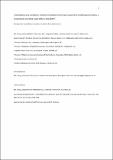Unconditional and conditional monetary incentives to increase response to mailed questionnaires : a randomized controlled study within a trial (SWAT)
Abstract
Rationale, aims, and objectives: High response rates to research questionnaires can help to ensure results are more representative of the population studied and provide increased statistical power, on which the study may have been predicated. Improving speed and quality of response can reduce costs. Method: We conducted a randomized study within a trial (SWAT) to assess questionnaire response rates, reminders sent, and data completeness with unconditional compared with conditional monetary incentives. Eligible individuals were mailed a series of psychological questionnaires as a follow‐up to a baseline host trial questionnaire. Half received a £5 gift voucher with questionnaires (unconditional), and half were promised the voucher after returning questionnaires (conditional). Results: Of 1079 individuals, response rates to the first follow‐up questionnaire were 94.2% and 91.7% in the unconditional and conditional monetary incentive groups, respectively (OR 1.78; 95% CI, 0.85‐3.72). There were significantly greater odds of returning repeat questionnaires in the unconditional group at 6 months (OR 2.97; 95% CI, 1.01‐8.71; .047) but not at 12 months (OR 1.12; 95% CI, 0.44‐2.85). Incentive condition had no impact at any time point on the proportion of sent questionnaires that needed reminders. Odds of incomplete questionnaires were significantly greater at 3 months in the unconditional compared with the conditional incentive group (OR 2.45; 95% CI, 1.32‐4.55; .004). Conclusions: Unconditional monetary incentives can produce a transitory greater likelihood of mailed questionnaire response in a clinical trial participant group, consistent with the direction of effect in other settings. However, this could have been a chance finding. The use of multiple strategies to promote response may have created a ceiling effect. This strategy has potential to reduce administrative and postage costs, weighed against the cost of incentives used, but could risk compromising the completeness of data.
Citation
Young , B , Bedford , L , das Nair , R , Gallant , S , Littleford , R , Robertson , J F R , Schembri , S , Sullivan , F M , Vedhara , K , Kendrick , D & ECLS study team 2019 , ' Unconditional and conditional monetary incentives to increase response to mailed questionnaires : a randomized controlled study within a trial (SWAT) ' , Journal of Evaluation in Clinical Practice , vol. Early View . https://doi.org/10.1111/jep.13230
Publication
Journal of Evaluation in Clinical Practice
Status
Peer reviewed
ISSN
1356-1294Type
Journal article
Description
The SWAT was part of a programme of research funded by Chief Scientist Office, Oncimmune Limited, and University of Nottingham PhD studentships.Collections
Items in the St Andrews Research Repository are protected by copyright, with all rights reserved, unless otherwise indicated.

